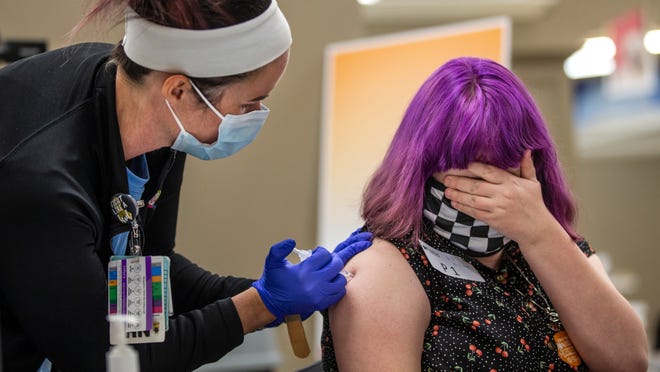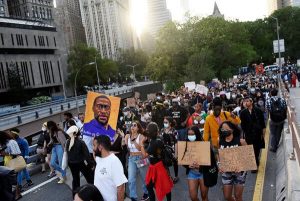Daily coronavirus cases continue to trend downwards in most states, falling by an average of 26,000 in the past month, according to data from Johns Hopkins University and the Centers for Disease Control and Prevention.
Deaths are also down in the nation. On January 13, the country reported 3,555 deaths, said Andy Slavitt, White House coronavirus response senior adviser, on Twitter. On Tuesday, there were 358 deaths in the country, according to Slavitt.
The vaccination rate for U.S. adults surpassed 50% Tuesday, according to the White House. At least 25 states have fully vaccinated at least half of their adult residents, according to data from the CDC.
Experts offered a hopeful message mixed with caution ahead of Memorial Day, and a task for Americans.
“I want to encourage you to take this holiday weekend to give yourself and your family the gift of protection by getting vaccinated,” CDC director Dr. Rochelle Walensky said during a White House news conference Tuesday. “We are on a good downward path, but we are not quite out of the woods yet.”
Also in the news:
►U.S. air travel rose to the highest level since the start of the pandemic Sunday at 1.8 million travelers, the Transportation Security Administration reported Tuesday.
►Gov. John Bel Edwards is scrapping nearly every remaining coronavirus restriction in Louisiana and lifting the statewide requirement that students must wear a mask in the classroom and at school events.
►Hawaii is no longer requiring people to wear face masks outdoors as the number of coronavirus cases drops and more people get vaccinated in the state.
►Even though the pandemic is waning in the U.S., there have already been more COVID-19 infections worldwide this year than in all of 2020. Here’s a graphic look at how much the coronavirus has spread globally.
►Royal Caribbean’s Freedom of the Seas will be the first cruise ship allowed to sail in U.S. waters as a test after a 15-month ban on cruises because of the pandemic.
📈 Today’s numbers: The U.S. has more than 33.16 million confirmed coronavirus cases and 590,900 deaths, according to Johns Hopkins University data. The global totals: More than 167.6 million cases and 3.48 million deaths. More than 359 million vaccine doses have been distributed in the U.S. and more than 287.7 million have been administered, according to the CDC. More than 131 million Americans have been fully vaccinated — 39.5% of the population.
📘 What we’re reading: The federal government has given the OK for states to offer cash incentives to encourage residents to get the COVID-19 vaccine. Read more about the opportunities.
Keep refreshing this page for the latest updates. Want more? Sign up for our Coronavirus Watch newsletter for updates to your inbox and join our Facebook group.
Report: Black people make up 8 in 10 COVID cases in Washington, highlighting vaccine disparities
Black residents of Washington, D.C., currently make up more than 80 percent of coronavirus cases, according to new data analyzed by the Washington Post. Although Black and white residents respectively make up 46% of the total population, according to the U.S. Census, white people account for less than 10 percent of cases in recent days.
The spike displays the nation’s racial divide and reflects issues of accessibility when it comes to disseminating the COVID-19 vaccine. The Post’s tracker reported that 44.5% of the city’s population has received the vaccine. For about 70 percent of vaccinations with racial data, the city estimates about 19.8 percent of Black residents are fully vaccinated compared to 28.8 percent of white residents.
“There’s a disparity in who’s getting vaccinated,” Neil Sehgal, an assistant professor of health policy at the University of Maryland, said to the Post. “And if those cases that we’re seeing are concentrated among unvaccinated people, and fewer Black residents of D.C. are getting vaccinated, it seems to reason that our Black neighbors are at a greater risk of contracting covid today than at any point in recent memory.”
According to Sehgal, barriers that may be keeping people from getting vaccinated include limited transportation, difficulties getting time off work to get the vaccine, and complicated sign-up systems.
– Steven Vargas
COVID-19 antibodies remain 10 months after infection, study says
A majority of people infected by COVID-19 still have antibodies against the virus 10 months later, according to a new study by Labcorp, a life sciences company that specializes in diagnostics and drug development.
Nearly 87% of confirmed positive individuals analyzed by the study saw extended antibody retention, according to the study published Monday. Labcorp took samples from 39,086 patients, making the study the largest real-world COVID study since the start of the pandemic.
The overall results spell good news not just for infected individuals, but potentially for vaccinated people, said Dr. Brian Caveney, Labcorp Diagnostics chief medical officer and president.
“More research must be done to understand what type and level of antibodies suggest protection from reinfection,” Caveney said. “But the prolonged presence of certain antibodies is a promising sign as we continue thinking about safely emerging from the pandemic, as well as future vaccinations and the timing of booster shots.”
Puerto Rico lifts curfew, opens up to vaccinated visitors
One more encouraging sign about the pandemic for Americans: Puerto Rico, a popular travel destination that was the first U.S. state or territory to go into lockdown, has lifted its nightly curfew.
The island has seen a 58% decline in new infections over the last two weeks after enduring a dramatic spike in April. Besides ending the nightly curfew after more than a year, Puerto Rico will now allow admittance to vaccinated visitors without a negative coronavirus test result. Business capacity will also increase to 50%.
Unvaccinated visitors to the U.S. commonwealth, where tourism is rising amid pent-up demand for travel, will still be required to present a negative coronavirus test or promise to offer a test result within 48 hours. Those who don’t comply could face a $300 fine.
Puerto Rico had been under some form of nightly curfew — at least from midnight until 5 a.m. — since March 15, 2020, when its first coronavirus case was reported. But daily cases have plummeted from a weekly average of more than 1,000 at the height of the April surge to about 150.
According to CDC data, 40% of Puerto Rican adults are fully vaccinated and 56% have received at least one dose.
Contributing: The Associated Press.



















